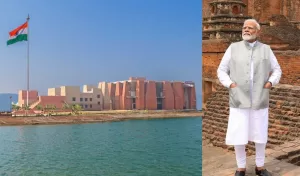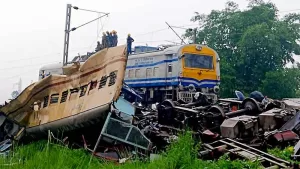New Delhi: The morning was already grey and windy when I reached the Kisan Mahapanchayat on Monday, March 20, at Ramlila Maidan in Delhi. Green, red, and yellow flags fluttered in the wind, and from a tiny stage, farmers’ leaders were starting afresh another revolution.
I walked past many familiar faces and also some new ones. It was slightly chilly too, and the sounds from the stage grew louder with each step. Thousands of farmers sat in front of the stage. There was no pandal to provide them with a covering, and the Delhi Police gave a 3 pm cut-off time to end the protest.
But somehow that didn’t dismay the crowds. Like in the days of the nearly year-long farmers’ protest of 2020-21, the energy was high. And judging from the dhotis and lungis, one could tell that farmers had come from Tamil Nadu, Telangana, Andhra, Karnataka, and even Bengal. It wasn’t just Uttar Pradesh, Punjab, and Haryana farmers at this meeting. But it was rather an all-India meeting organised by Samyukta Kisan Morcha (SKM).
After all, this was their comeback protest. It was, for the first time, SKM farmers entered Delhi after the long-drawn protest, and there was Rakesh Tikait on the stage not mincing words again. “We need to do a bigger andolan (movement), because democracy is being killed. Look what is happening in elections. Uttar Pradesh elections are a perfect example of how official pressure was used to make its own people win. Believe me, this country won’t be saved without andolans,” declared Tikait.
He was reiterating the demand for a minimum support price (MSP) guarantee law and implementation of M.S. Swaminathan’s report for solving India’s agrarian problem. When I met Tikait after his speech, he candidly said, “We need a vaicharik kranti (ideological revolution), otherwise the country will be sold to corporations, and farmers and farming will all be run by corporations. We are fighting to save India.”
After Tikait, I met up with farmers’ leader Darshan Pal. We spoke to him for a while and then I asked him about the turnout; usually, the farmers’ rallies are overcrowded. “There are two main reasons: firstly, due to western disturbance, the whole of Punjab has been washed out, and farmers are running to save their crops; and the second Khalistan-related crackdown, internet and other services have been suspended. In my view, three-fourths of farmers from Punjab weren’t able to make it,” he explained.
But Pal was confident of the movement. “This is the third action in the second phase. First was memorandum submission, the second was intra-states rallies, and the third is this Delhi rally. We are planning another meeting on April 20, where we will declare a national agenda.”
“2024 is an election year and the farmers’ movement has to be taken to its logical end. There need to be MSP guarantee laws and debt relief for farmers. Being an election year, we can put pressure on governments and political parties to resolve some problems of the agrarian society,” he added.
When I probed him further on the SKM’s split and splinter factions, he said, “This rally is a united SKM rally. Left and other democratic farmers and workers’ organisations have come together and pledged to work for resolving the agrarian crisis. And if Rajewal and other splinter groups also come back with clean intentions of not breaking away again, we will accept them. All farmers’ organisations are welcome, although we want the political outfits should be separate from farmers’ organisations.”
Meanwhile, Joginder Singh Ugrahan, farmers’ union leader, was up on the stage. “This new economic model and policy of the government is for corporates and not farmers. After the farm laws were rescinded, the government is now trying to find other ways to implement the farm laws and corporatise Indian farming. We won’t allow it,” he said, drawing cheers from the assembled crowd there.
When he got down from the stage, I caught up with him and asked him about the other demands. “Justice for Lakhimpur [where farmers were killed after being run over by speeding cars], MSP guarantee law, suspension of electricity bill and de-corporatisation of the power sector, withdrawal of cases against farmers, compensation for martyrs of the movement, and finally farmers’ debt relief, crop insurance coverage for climate-related damages and farmers pensions.”
But the question is whether the farmers’ movement is strong enough to make the government listen. Ugrahan was honest with his answer: “This movement is not the same. The three laws were a big issue and post the rescinding, the movement has become weak because of the ego of certain people, who have other ambitions. This is a people’s movement and they gave it power, not an individual or organisation. Some people had other political ambitions too and that’s why they got splintered. Of course, things are not the same, but we regrouping and building a coalition to demand our rights.”
Leaders like Ugrahan have seen many movements and governments come and go, he tells me that “patience is the most important thing” in running a movement. “Thousands have come and gone, but they were all part of the journey. People join us, sometimes they stay, and at times, they leave us. For example, before Andolan, we were working in 600 villages, but now we work in 2,000 villages. This is a long fight for justice. And we are ready for it.”
It was now already the cut-off time, and many of the farmers’ leaders had to leave to meet Union agriculture minister, Narendra Singh Tomar. I stuck around, and once when the meeting was over, I caught up with the senior leader and former MP Hannan Mollah of the All India Kisan Sabha (AIKS).
“This is a fascist government. Only if we exert pressure on it, will it listen to farmers. Because no civilised government would forget about its own letter and promises. In fact, any civilised government would be ashamed of not delivering on its promises,” he said.
I asked why he was disconcerted, and he looked at me and said, “It’s been over a year since the government said it will bring a law on MSP and make a committee. But look at the members of the committee, they are all dalals (power brokers/schemers) and anti-farmer people. They anyways abuse the farmers openly, and that is why we didn’t participate in the committee meetings. The government didn’t even have the courtesy of allowing BJP’s own farmers’ groups and leaders to be on the committee. Overall, it’s a corporate-driven charade and is backed by policies of the World Bank and WTO [World Trade Organisation].”
So, is there any hope? Hannan Mollah replied, “You can fool some people for all time, but you can’t fool all people for all the time. The truth will come out and then people will demand answers.”
(Indra Shekhar Singh is an independent agri-policy analyst and writer. Courtesy: The Wire.)




